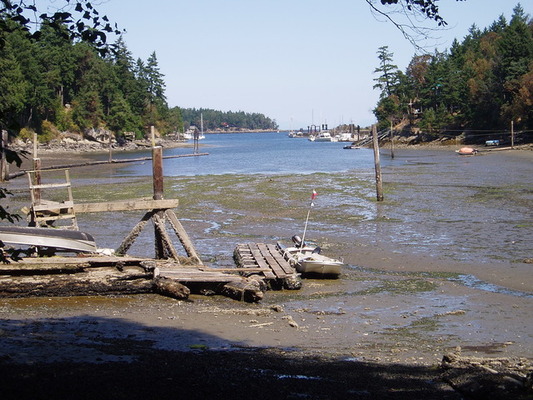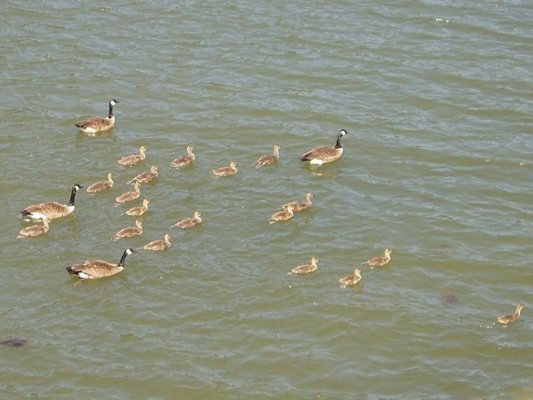Go To the Whaler
Bay website
 When Islanders think about the south
arm of Whaler Bay, what comes to
mind? The log dump, the government dock, a muddy polluted bottom,
fouled water, bad smells on Sturdies Bay Road? To some extent this is
true. Its very name comes from its early role as a harbour for small
whaling vessels. Whaler Bay is also surrounded by some of the
densest development of any area of Galiano.
When Islanders think about the south
arm of Whaler Bay, what comes to
mind? The log dump, the government dock, a muddy polluted bottom,
fouled water, bad smells on Sturdies Bay Road? To some extent this is
true. Its very name comes from its early role as a harbour for small
whaling vessels. Whaler Bay is also surrounded by some of the
densest development of any area of Galiano. The last several springs have seen
Canada Geese raising large
gaggles of goslings in the bay. We are seeing more ducks, cormorants,
and goldeneyes each year. The resident heron is now often joined by
several more during the summer months. The presence of eagles and
kingfishers can now be relied upon year after year.
The last several springs have seen
Canada Geese raising large
gaggles of goslings in the bay. We are seeing more ducks, cormorants,
and goldeneyes each year. The resident heron is now often joined by
several more during the summer months. The presence of eagles and
kingfishers can now be relied upon year after year.  A Mute Swan
stayed for several months, working dock after dock demanding food
between stints of feeding on more natural foods growing in the bay.
This swan clearly had had previous human contact - maybe it was seeking
a respite from its home in Stanley Park. Sightings of oystercatchers
have also been reported.
A Mute Swan
stayed for several months, working dock after dock demanding food
between stints of feeding on more natural foods growing in the bay.
This swan clearly had had previous human contact - maybe it was seeking
a respite from its home in Stanley Park. Sightings of oystercatchers
have also been reported. includes the shoreline as
part of its foraging area. River Otters are regular visitors,
alternating between fish feasts and eating the mussels off of dock and
boat bottoms. Even deer can now be seen out in the exposed flats at low
tide looking for food.
includes the shoreline as
part of its foraging area. River Otters are regular visitors,
alternating between fish feasts and eating the mussels off of dock and
boat bottoms. Even deer can now be seen out in the exposed flats at low
tide looking for food.